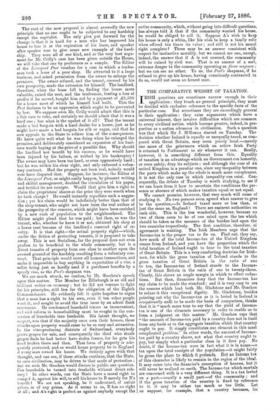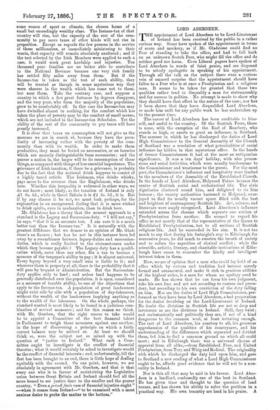THE COMPARATIVE WEIGHT OF TAXATION.
IRISH questions are sometimes narrow enough in their application ; they touch no general principle, they must be decided with exclusive reference to the specific facts of the particular case. But sometimes they are exceedingly general in their application ; they raise arguments which have a universal interest, they involve difficulties which are common to every civilised nation, which become greater, indeed, in pro- portion as a nation advances in civilisation. Such a question was that which Sir J. M'Kenna started on Tuesday. The decision whether Ireland is equally or unequally taxed, as com- pared with Great Britain, may seem purely local,—merely one more of the grievances which an active Irish Party is returned to Parliament to air whenever it can. Really, however, it is something different from this. Equality of taxation is an advantage which no Government can honestly, or even safely, deny its subjects ; and although the case of an united Kingdom is a peculiar one, since any inequality between the parts which make up the whole is much more conspicuous, it is not the only case in which inequality can exist. Con- sequently, the debate of Tuesday is worth studying, to see if we can learn from it how to ascertain the conditions the pre- sence or absence of which makes taxation equal or not equal.
We cannot promise, however, that very much will come of studying it. No two persons seem agreed what answer to give to the question,—Is Ireland taxed more or less than, or just the same as, England ? There are eminent authorities on each side. This is the less wonderful, however, because no two of them seem to be of one mind upon the tax which should be taken as the measure of the burden laid upon the two countries respectively. The first condition, therefore, of agreement is wanting. The Irish Members urge that the Income-tax is the proper tax to fix on. Find out, they say, how much of the total Income-tax of the United Kingdom comes from Ireland, and you have the proportion which the total taxation of Ireland ought to bear to the total taxation of Great Britain. This is a very comforting doctrine for Irish- men, for while the gross taxation of Ireland stands to the gross taxation of Great Britain in the ratio of one to ten, the Income-tax of Ireland stands to the Income- tax of Great Britain in the ratio of one to twenty-three. Clearly, this shows an ample margin in which to effect reduc- tions. But then, financiers deny that the Income-tax has any claim to be made the standard ; and it is very easy to see the reasons which lead both Mr. Gladstone and Mr. Goschen to refuse it this exceptional dignity. Mr. Gladstone, besides pointing out why the Income-tax as it is levied in Ireland is exceptionally unfit to be made the basis of comparison, thinks that it is "much more true to say that the yield of Income.- tax is one of the elements necessary in order to enable us to form a judgment on this matter." Mr. Goschen says that "the amount of Income-tax paid by a country does not in itself form any basis as to the aggregate taxation which that country ought to pay. It simply constitutes one element in this most complicated problem." In other words, the amount of Income- tax paid by a country shows, not what that country ought to pay, but simply what a particular class in it does pay. No doubt, if the Income-tax were in fact what it is in name—a tax upon the total receipts of the population—it might fairly be given the place to which it pretends. But an Income tax of this character is likely to remain in the region of the ideal. It may enter into the financier's conception of heaven, but it will never be realised on earth. The Income-tax which mortals are concerned with is a very different thing. It is a tax levied on a part—usually a small part—of the community ; and if the gross taxation of the country is fixed by reference to it, it may be either too much or too little. Let us suppose, for example, that a country becomes, for
some reason of sport or climate, the chosen home of a small but exceedingly wealthy class. The Income-tax of that country will rise, but the capacity of the rest of the com- munity to pay more taxes of other kinds will not rise in proportion. Except as regards the few persons in the service of these millionaires, or immediately ministering to their wants, that capacity will remain absolutely unaltered ; and if the test selected by the Irish Members were applied to such a case, it would work great hardship and injustice. Ten thousand poor families are no better able to contribute to the National Revenue because one very rich family has settled fifty miles away from them. But if the Income-tax is taken as the test of such ability, they will be treated as though in some mysterious way they were sharers in the wealth which has come not to them, but near them. Take the contrary case, and suppose a country in which a few great fortunes by degrees disappear, and the very poor, who form the majority of the population, grow to be comfortably off. In this case the Income-tax may have dwindled almost to nothing, for the comfort which has taken the place of poverty may be the comfort of small means, which are not included in the Income-tax Schedules. Yet the ability of the rest of the community to pay taxes will have greatly increased.
It is clear that taxes on consumption will not give us the measure we are in search of, because they have the pecu- liarity of increasing rather with the poverty of the com- munity than with its wealth. In order to make them productive, they must be levied on necessaries, or on luxuries which are scarcely distinguishable from necessaries ; and the poorer a nation is, the larger will be its consumption of these things, as compared with things of less essential importance. The grievance of Irish taxation, if there be a grievance, is probably due to the fact that the national drink happens to consist of a highly taxed article. The Irishman, who drinks whisky, pays more to the revenue than the Englishman, who drinks beer. Whether this inequality is redressed in other ways, we do not know ; most likely, as the taxation of Ireland is only otl 6s. 4d., while in Great Britain it is £2 3s. 5d., it is. But if by any chance it be not, we must look, perhaps, for the explanation in an unexpressed feeling that it is more wicked to drink spirits, even in moderation, than to drink beer.
Mr. Gladstone has a theory that the nearest approach to a standard is the Legacy and Succession-duty. "I will not say," he says, "that it is an accurate test. I am sure it is a much better test than the Income-tax." It is naturally with the greatest diffidence that we demur to an opinion of Mr. Glad- stone's on finance ; but has he not in this instance been led away by a resemblance between legacy-duties and succession- duties, which is really limited to the circumstances under which they become payable ? The Legacy-duty has a qualifi- cation which, more than any other, fits a tax to become a measure of the taxpayer's ability to pay ; it is almost universal. Every legacy beyond a very small sum is liable to it ; and wherever there is property at all, there is the probability that it will pass by bequest or administration. Bat the Succession- duty applies only to land ; and unless land happens to be generally distributed over the population, it is open, considered as a measure of taxable ability, to one of the objections that apply to the Income-tax. A population of great landowners might exist side by side with a population of day-labourers, without the wealth of the landowners implying anything as to the wealth of the labourers. On the whole, perhaps, the standard wanted is most likely to be found in a judicious com- bination of several measures ; and for this reason we think, with Mr. Goschen, that the right course to take would be to appoint a Committee of the best financial talent in Parliament to weigh these measures against one another, in the hope of discovering a principle on which a fairly correct balance may be arrived at. At least we should think so, were the subject not so mixed up with the question of "justice to Ireland." What such a Com- mittee ought to investigate is the conflict of financial theories ; what it would certainly be asked to investigate would be the conflict of financial interests ; and, unfortunately, till the first has been brought to an end, there is little hope of dealing equitably with the second. On one point, however, we are absolutely in agreement with Mr. Goschen, and that is that every one who is in favour of maintaining the Legislative union between Great Britain and Ireland should feel all the more bound to see justice done to the smaller and the poorer country. "Even a primd facie case of financial injustice ought" —when it comes from Ireland—" to be examined with a most anxious desire to probe the matter to the bottom."



































 Previous page
Previous page